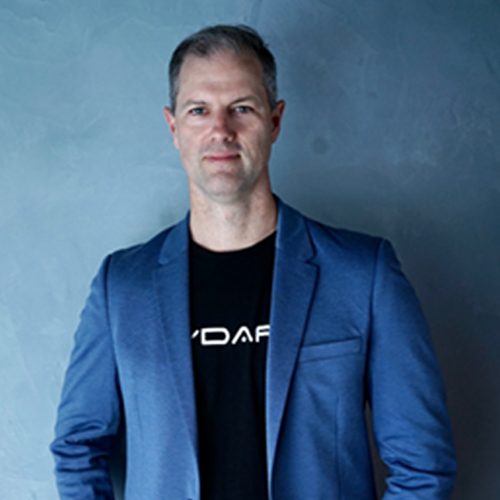On the lighter side of things, we ask Vaughan Shanks, CEO of Cydarm, what makes him tick.

What would you describe as your most memorable achievement?
Landing the first customer for Cydarm back in 2018 – an ASX Top 50 organization, no less! I distinctly remember when they made the decision to go ahead with us. It was a proof of concept, so not a paid engagement – totally fair, given the stage our product was at – and I was asked to meet the team and give a demo. They sat through the demo, lots of poker faces, and then at the end, this one analyst said: “Well, it’s better than our current system, I’m in.” It was instant validation and encouraged me to keep going.
What first made you think of a career in technology?
As a four-year-old, I was obsessed with NASA and going to space. I think that made me naturally inclined towards technology. My late great uncle Albert was a seminal influence: he was a rocket scientist and electrical engineer who used to build computers at home out of wire wrap and breadboards. Then there was my mother – she was an analyst programmer who would bring home spent punch cards for me to draw on, as recycled paper. Being steeped in this atmosphere growing up, it was almost preordained I would go into tech!
What style of management philosophy do you employ with your current position?
I bifurcate my role into management and leadership. Management is basically about being an efficient administrator; delegating tasks and meeting schedules and all that stuff. I see that as a technical discipline. The more important part is leadership, and that to me is about influence – being able to show people how you want them to behave, with one another and with your customers. A lot of my style is drawn from leaders I admire. I’ve had the privilege of working for some very good ones, in the public and private sectors, and I’ve tried to implement their best traits.
What do you think is the current hot technology talking point?
It’s cybersecurity, from my perspective. As the world starts fracturing and we are seeing globalization going into reverse, we’re increasingly realizing that all the general-purpose technology we rely on to keep life running, is actually not reliable and secure.
We’ve built on a shaky foundation and created vast interconnected IT estates full of undiscovered bugs and security holes. Senior leaders in many countries have realized this and that’s why they’ve begun issuing mandates and executive orders to enforce better security across the supply chain.
How do you deal with stress and unwind outside the office?
Spending time outside of the office with the people in my life who are important to me gives me perspective and reminds me of why it is I do what I do. I love active sports such as running and cycling, especially in nature. As far out into the wilderness as possible is my preference although, unfortunately, these days, that’s not usually very far, given my schedule.
I have multiple bikes but, being a city dweller, it’s the road bike that gets the most use. There’s a group I ride with now and again but more often I go out by myself for three or four hours on a weekend. As long as there are hills and trees, I’m happy!
If you could go back and change one career decision, what would it be?
I was a third-year computer science student in 1997, a couple of years after the web had been popularized. As a team project, my group developed a system for putting emails on a website. We couldn’t see a practical need for it but we said: “let’s do it because we can and we’ll get a high mark.”
So we built the system, named it BobMail, for want of a better name, got A-pluses for our efforts and then at the end of the semester we canned it. Just a few months later, a company called Hotmail was sold to Microsoft for hundreds of millions of dollars. We’d literally built a Hotmail equivalent and then wrote it off because we weren’t thinking big, didn’t have the vision and didn’t believe that a group of undergrads in Australia could develop world-class technology.
What do you currently identify as the major areas of investment in your industry?
It’s not a buzzword topic but one thing customers care a lot about is interoperability. When they get a new system, knowing it’s going to connect with their legacy infrastructure, they don’t have to do a bulk rip and replace or work with consultants to integrate everything.
Several of the large vendors got together recently and announced a new data format for interoperability. For people outside the industry, it may sound boring but it’s a game changer.
What are the region-specific challenges when implementing new technologies in APAC?
Skills shortage is a big one. If you look at Australia, our STEM participation rates in high school are at all-time lows. Personally, I cannot understand why more people do not pursue careers in STEM, given the way the world is going, but for some reason, people are overlooking this opportunity. That’s created a pipeline problem and a squeeze for employers. There are too many open jobs and not enough people to go around and that means it’s hard to assemble a team to execute a vision. The other issue is that Australia’s a small market and potential customers are often conservative by nature when making tech choices.
What changes to your job role have you seen in the last year and how do you see these developing in the next 12 months?
We’ve had a big increase in the size of our team – up from nine staff in late 2021 to 15. I’ve encouraged the team to build processes around some of the things we do, so people’s responsibilities are defined and handoffs are clear. In early 2022, I set myself the goal of becoming the world’s best delegator but feedback from the team suggests I’m not there yet! Over the next year, I’ll be focusing more on strategy and getting myself out of the day-to-day, tactical stuff.
What advice would you offer to someone aspiring to obtain a C-level position in your industry?
I’ve never been a CEO prior to this position and there’s no way I would have been picked for the role at a traditional ICT company because I don’t have a traditional corporate background. Becoming the CEO of a start-up is a different journey. The fastest way to get there is to register a company and employ yourself! You need to back yourself but don’t be naive. Have some idea of the responsibilities you’re taking on and prepare yourself for them: learn how venture capital funding works; practise leadership skills; and, if you’re a technologist like me, develop an understanding of economics and accounting. In short, identify your blind spots and do whatever you can to fill them, by the fastest possible means.
Click below to share this article

